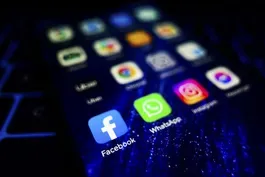
The unique challenges of dating with disabilities
Clip: 2/10/2024 | 8m 10sVideo has Closed Captions
The unique challenges of dating and finding love while living with disabilities
With Valentine’s Day around the corner, love is on many people’s minds. For people with disabilities or chronic illnesses, navigating the dating world can come with many challenges. Stephanie Sy reports.
Problems with Closed Captions? Closed Captioning Feedback
Problems with Closed Captions? Closed Captioning Feedback
Major corporate funding for the PBS News Hour is provided by BDO, BNSF, Consumer Cellular, American Cruise Lines, and Raymond James. Funding for the PBS NewsHour Weekend is provided by...

The unique challenges of dating with disabilities
Clip: 2/10/2024 | 8m 10sVideo has Closed Captions
With Valentine’s Day around the corner, love is on many people’s minds. For people with disabilities or chronic illnesses, navigating the dating world can come with many challenges. Stephanie Sy reports.
Problems with Closed Captions? Closed Captioning Feedback
How to Watch PBS News Hour
PBS News Hour is available to stream on pbs.org and the free PBS App, available on iPhone, Apple TV, Android TV, Android smartphones, Amazon Fire TV, Amazon Fire Tablet, Roku, Samsung Smart TV, and Vizio.
Providing Support for PBS.org
Learn Moreabout PBS online sponsorshipJOHN YANG: With Valentine's Day just around the corner, love is on a lot of people's minds.
But the course of true love never did run smooth.
Or in the case of some of the people on our next story, roll smooth.
As Stephanie Sy tells us, for people living with disabilities or chronic illnesses, dating can come with unique challenges.
STEPHANIE SY (voice-over): Clare Smith and Iman Rahman have been dating for over a year.
IMAN RAHMAN: I was like, so when are we going to go out?
And she was like, whenever you ask me.
So then I was like, oh, I guess I gotta ask her now.
STEPHANIE SY (voice-over): They met on Instagram, and while the couple lives on opposite coasts, their mutual experience with chronic illnesses tied them together.
CLARE SMITH: Within the first, I don't know, month or so of us dating.
I had my headphones and listening to her just like, vomiting over the toilet.
IMAN RAHMAN: So the next thing I know, my mom's like, hey, you got a package.
I think it's from her.
And it was just a package of a ton of vomit bags.
STEPHANIE SY (voice-over): Not exactly your traditional romantic gesture.
But Clare and Iman found a special intimacy by sharing their health challenges early on.
CLARE SMITH: We have to get over the uncomfortable parts in the beginning really fast, and you don't have a choice.
Either that person is going to be somebody that you're comfortable doing this with, or it's not.
IMAN RAHMAN: Cheers.
STEPHANIE SY (voice-over): But not everyone is ready to put it all out there from the start.
SHANNA KATTARI, University of Michigan: One of the biggest challenges is even to decide when to come out or disclose your disability, especially if you either have a non apparent or invisible disability or you're using something like a dating profile.
STEPHANIE SY (voice-over): Shanna Katz Kattari is a sexuality researcher at the University of Michigan.
Kattari is chronically ill and know if.
SHANNA KATZ KATTARI: You know, if you're a wheelchair user, do you put a picture of your chair in the profile?
Or do you wait until you roll up to the cafe where you're both going on the first date and see if somebody turns around and walks out?
STEPHANIE SY (voice-over): Roughly one in four adults in the United States has a disability, and they are half as likely as non-disabled people to ever have been married.
We talked to more than a dozen people with disabilities and chronic illnesses, each navigating the dating world in their own way.
CHELSEA BEAR: I remember there was a time at the very beginning when I wouldn't put my disability at all anywhere on my profile.
Even in chatting with a match, I wouldn't tell them.
And I would even just show up to the date walking how I do and hope for the best.
STEPHANIE SY (voice-over): Over time, Chelsea Baer, who has cerebral palsy, has changed her approach.
CHELSEA BEAR: Now I'm very open.
I have it right there on my profile.
I personally make a little joke out of know.
I say I have princess parking or make something fun about my mobility scooter just because that's my personality, and I want them to know it's okay to talk about it.
STEPHANIE SY (voice-over): Maxine Starr weeds out poor prospects with efficiency.
MAXINE STARR: It doesn't make sense to invest in a week or two or whatever and then tell the person, and then they're not interested.
STEPHANIE SY (voice-over): She gets a lot of questions about her visual impairment.
MAXINE STARR: How do you get dressed?
You know.
How'd you get here?
You know.
Can you see that glass right there in front of you?
I've had some where it might have went to an actual date after that, but the reality kicked in once I brought the cane and took it out.
STEPHANIE SY (voice-over): Russell Lehmann says telling dates that he is on the autism spectrum can quickly end the conversation.
RUSSELL LEHMANN: Once they found out I was autistic, they just unmatched me.
And so I think a lot of people are just scared.
STEPHANIE SY (voice-over): Scared or in Jacqueline Child's experience bigoted.
Child has a connective tissue disorder.
JACQUELINE CHILD, Co-Founder, Dateability: As a disabled woman, I experience so much discrimination on the mainstream dating apps.
The most offensive one was telling me to not have any biological children.
STEPHANIE SY (voice-over): This kind of discrimination against the disabled is referred to as ablism.
It was Child's experiences on dating apps that inspired her and her sister Alexa to create their own.
They called it Dateability.
ALEXA CHILD, Co-Founder, Dateability: We came up with a profile section called the Dateability deep section, and that is an extensive list of broad terms used to describe one situation, like immunocompromised wheelchair user food allergy.
It sends this signal to our users that we see you.
We don't view your chronic illness or disability with shame.
STEPHANIE SY (voice-over): But online dating apps aren't for everyone.
MAXINE STARR: I'm too scared to do the online thing because I wouldn't disclose online to somebody I don't know and can't see.
STEPHANIE SY (voice-over): More than three decades after the Americans with Disabilities Act was passed, people with disabilities are often still excluded from and misunderstood by society.
Shanna Katz Kattari says that can create a lot of anxiety around dating.
SHANNA KATZ KATTARI: I hope that the tables aren't high tops because my body can't sit in.
It's very trendy now to have the high tops.
I hope we're not going to show up at a restaurant and I can't sit.
STEPHANIE SY: What do you feel like are some of the misconceptions that nondisabled people have about people with disabilities, their dating lives, their sex lives?
SHANNA KATZ KATTARI: I think nondisabled people really buy into a lot of the notions that have been perpetuated around disability and disabled people, such as disabled folks are all asexual, which is not true.
There is this idea that we should feel grateful to be asked on a date or grateful to be partnered with, which is totally not the case.
STEPHANIE SY (voice-over): And even with loved ones, the conversation of dating can be difficult.
Iman Rahman says she had to convince her family she was ready to date.
IMAN RAHMAN: I was asked a lot of questions that I don't know if a lot of my friends were when they were talking to their parents about dating.
Like, you know, do you really think you should be doing know if they're not?
Like, do you think they can take care of you?
SHANNA KATZ KATTARI: I think we really spend a lot of time focusing on the negative, the problems, what should be different?
Disabled folks, we are scrappy.
We are creative.
STEPHANIE SY (voice-over): Kattari believes people with disabilities are better at saying what they're looking for and what they need because they have to.
CHELSEA BEAR: So often I just want someone that knows who they are.
They're not afraid of to be themselves.
RICH BISKER: I need someone that I can say, like, the past few days have been high pain days for me and I can say to them, I'm having a high pain day, and they'll just hug me or something.
AKILHA CADET: I think the most important one is if I have my cane, they're still not afraid to hold my hand or put their hand on my back.
RUSSELL LEHMANN: If I start sobbing, people are going to be like, what the hell?
He's a man.
But when those few select special women can just hold me and embrace me and all that I am through the peaks and valleys.
EVELYN VALDEZ: And most of all that person not enabling me at all, like, just treating me as a human being and not as a person who's just blind, but just treating me like Evelyn, you know.
CLARE SMITH: Oh, my goodness, look at you.
STEPHANIE SY (voice-over): For Claire and Iman, just feeling seen by the other, whether long distance or in person, is key.
STEPHANIE SY: What are you doing when you feel the happiest together?
IMAN RAHMAN: I cannot express to you how many times I just feel grateful to be holding her hand.
Just like getting through this, getting through a day of just feeling so much pain or getting through a day of feeling so much anxiety about everything.
CLARE SMITH: I was just sitting here looking at her.
It makes me so happy, and it fills me with just so much pride and joy when I just sit here and hear her talk.
It's been so rewarding and so lovely to just be on this journey with her.
STEPHANIE SY (voice-over): For PBS News Weekend, I'm Stephanie Sy.
The role of social media companies in the 2024 election
Video has Closed Captions
Can social media companies safeguard the 2024 election against misinformation? (6m 18s)
What to know about protests against the far-right in Germany
Video has Closed Captions
What to know about Germany’s far-right politics and protests against its rise (5m 10s)
Providing Support for PBS.org
Learn Moreabout PBS online sponsorshipSupport for PBS provided by:
Major corporate funding for the PBS News Hour is provided by BDO, BNSF, Consumer Cellular, American Cruise Lines, and Raymond James. Funding for the PBS NewsHour Weekend is provided by...













